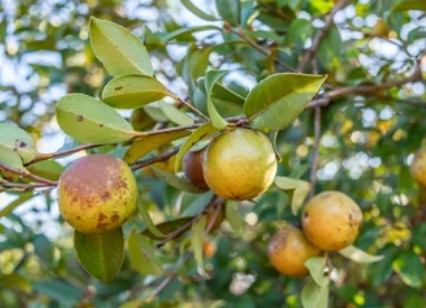Camellia oleifera is a genus of Camellia and a woody oil tree species. Oil tea tree is known as one of the four major woody oil crops in the world, along with oil olive, oil palm, and coconut. The unsaturated fatty acid content of tea oil is much higher than that of vegetable oil, peanut oil, and soybean oil. The vitamin E content of tea oil is twice as high as that of olive oil. It contains specific physiologically active substances, such as camellia glycosides, which have high nutritional value. The development of the oil tea tree industry can greatly improve the efficiency of land resource use and guarantee the safety of food and oil. With the development of production and the increasing demand of society, people put forward higher and higher requirements on the yield, quality, and resistance of oil tea tree varieties, and the solution to these problems can no longer be satisfied by traditional breeding means alone. The emergence and development of transgenic technology have provided a new method for improving oil tea tree varieties.

After years of development and technical research, Lifeasible has a mature and high success rate of genetic transformation and cell regeneration system, which can provide stable transgenic technology service for customers of oil tea trees. Our experienced team of experts can work one-on-one to customize the program to meet the needs of our customers. Our oil tea tree transformation technology platform, using Agrobacterium mediated method, can complete the whole experimental process from vector construction to obtaining transgenic plants for you, helping you save valuable research time. Our wide range of Agrobacterium and selectable marker vector constructs ensure that your project needs are met. We offer the following range of constructing vector transformation methods for you to choose from.

Customers can provide constructed oil tea tree transformation vectors directly, and Lifeasible also offers vector construction services.
| Concentration | Volume | Other requirements |
| 80-100 ng/μL | ≥10 μL | no degradation & no contamination |
| Bacterial broth | Bacterial plate |
| Bacterial broth up to 1-year-old, preserved in glycerol | Bacterial plate activated within one week |
*For special varieties and customized services, the experiment time and the number of seeds needed may be increased. For this, please contact our staff for more information.
*Plasmids, E. coli, and Agrobacterium require cryopreservation and mailing under dry ice to avoid degradation, inactivation, and impact on experimental results.
*The strains, vectors, and receptor materials used in the experiment can be saved for free for half a year for customers, and you can pick them up at any time if you need them.
Our experiments are open and transparent throughout the entire process, covering project consultation, experiment customization, vector construction, professional operation, and progress reporting. When the project reaches a critical point, we will inform you in time in case you miss it. Of course, you can also contact us at any time to get an immediate update on the progress of your experiment. Our one-stop service is designed to reduce your research burden and save time, so you can relax and focus on other more important aspects of your research.
Lifeasible's experts have comprehensive knowledge and years of experience in solving technical problems and challenges in camellia oleifera transformation. We can provide customized solutions to help you study a wide range of oil tea tree varieties. Our services guarantee the success of your project. For more information or any inquiry needs, please feel free to contact us.